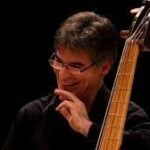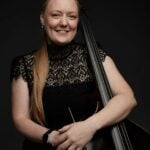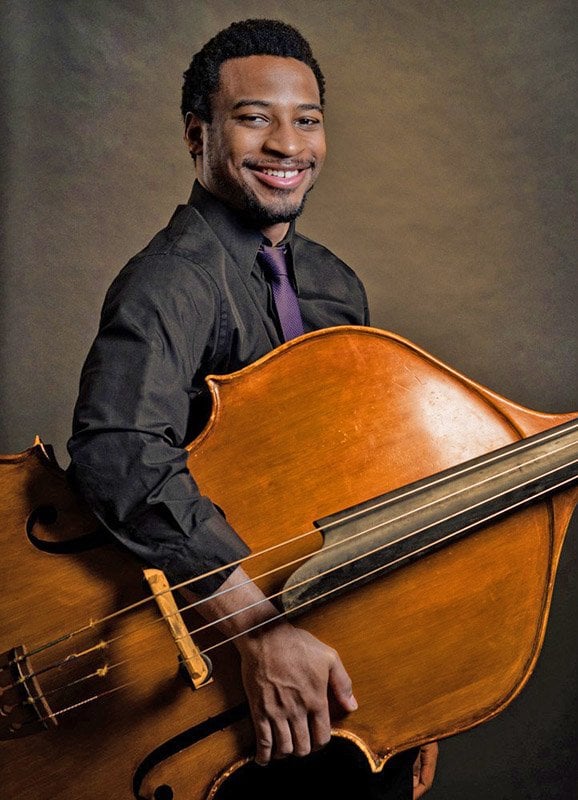The solo double bass: pride or prejudice
The solo double bass: pride or prejudice
written by Barry Green
This article originally appeared in Stringendo Volume 46 Number 1 April 2024. All images provided by Barry Green.
Barry Green is the AUSTA International Touring Artist in July and August 2024.
Learn more about where you can see Barry here.
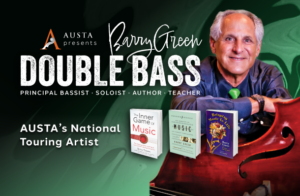 Why is it that, in jazz or classical circles, the idea of listening to a bassist playing a solo ranks about as desirable as being forced to eat lima beans or spinach? I have no doubt that, in general, the public is more attracted to eating pizza, hamburger and chocolate lava cake! Who decides what the music-going public ‘eats’? Is it personal choice or what a ‘chef’ decides is best to serve? How does this analogy translate into a concert of solo bass music?
Why is it that, in jazz or classical circles, the idea of listening to a bassist playing a solo ranks about as desirable as being forced to eat lima beans or spinach? I have no doubt that, in general, the public is more attracted to eating pizza, hamburger and chocolate lava cake! Who decides what the music-going public ‘eats’? Is it personal choice or what a ‘chef’ decides is best to serve? How does this analogy translate into a concert of solo bass music?
Within this question is perhaps a clue as to why bass solos in jazz and classical music don’t attract much support, compassion or open-mindedness. I propose a different pathway for bassists that allows them to sidestep prejudices, traditions and the unwillingness of the public to accept the double bass as a solo instrument.
A famous jazz teacher once said that if a bassist takes a solo, then it doesn’t matter how many years people have refused to talk to one another: even the most bitter enemies in an audience will suddenly start talking to each other for the entire solo.
A few celebrated classical and jazz bassists have transcended this prejudice: Gary Karr, the great entertainer with a soulful sound; Francois Rabbath, the cultural wizard and popular master of classical, Middle Eastern fusion and jazz; and jazz greats like Christian McBride, a radio host, out-of-this-world virtuoso and the Leonard Bernstein of the bass, who interviews and performs with the great jazz artists of the world. When John Clayton plays his heartstopping bowed ballad, Emily by Johnny Mandel, jazz clubs get eerily quiet and the audience leaves talking about Clayton’s breathtaking, soulful playing being the highlight of the evening! Yes – bass solos!
Unfortunately, everyone doesn’t have the same performance gifts as these superstars. But I suggest most any good musician can embrace some things these artists do through a change of their musical intentions. The main thing is to ask, what is your performance goal? Who are you playing for?
Before I reveal this performance goal, I don’t want to minimise the need for mastery of your craft through a lot of dedicated practice, studying with great teachers, patience and discipline. There is no room in the music business for playing out of tune, out of time, out of style and without a clean connection between your mind, body, spirit and your instrument.
There are no shortcuts. It’s your responsibility to always be the master of your craft. Are you ready for the great reveal? It can be reduced to one sentence…
It isn’t about you – it’s about them!
The ‘you’ in this statement represents your instrument, repertoire and performance. ‘Them’ represents the audience: their likes, interests, and willingness to listen to and consume what you deliver through your performance.
Think about the great artists I mentioned above. They’ve created fantastic musical dishes any audience would enjoy. They delight, entertain, tantalise and serve gourmet musical masterpieces that delight their audiences.
Australia is the home of the celebrated bassist, Rob Nairn, a specialist in historical performances who has found great audiences for authentic early music. Rob’s performances bring out his fans of Renaissance music!
The awesome and expressive Melbourne solo bassist Phoebe Russell augments her solo career playing with Ensemble Q, a chamber music collaborative of world-class musicians. Music of Mozart, Haydn, Schubert, Mendelssohn and Beethoven are audience favourites.
Sydney’s Elsen Price, the ultimate contemporary, improvisatory, creative and collaborative musician, has taken his bass to pubs, dance halls and folk festivals, performing with youthful and likeminded avant-garde, talented musicians.
Through media such as YouTube, television, movies and live concerts, we have become a visual culture that values young, dynamic, attractive and physically animated virtuoso performers like bassist Mikyung Sung. She is a fearless, intense, dynamic and beautifully expressive Korean bassist.
Composer-bassist Xavier Foley, who won the 2014 Sphinx competition winner in his early twenties, is one of the world’s most creative, ferocious and virtuosic talents. He is a great role model for the next generation of young bass soloists, and his own folksy and melodic musical style is appealing to virtually everyone.
- Rob Nairn
- Phoebe Russell
- Elsen Price
- Mikyung Sung
- Xavier Foley
Think about these great artists. Their artistry often leaves an audience breathless and speechless. There are thousands of less-than-superstar musicians who play instruments other than the bass that are rarely featured in solo concerts, such as the viola, trombone, percussion and accordion. Can they find a way to create a different environment to attract audiences more accepting of their artistic talents? I believe so.
When you choose to watch a movie or attend a play or musical, either at home or in the theatre, and are willing to pay a lot of money for this experience, you expect something in return. I’m sorry to say I don’t believe a lot of people, other than for a few bass players, will spend their time and hard-earned cash to attend a rather unimaginative performance of the Koussevitzky or Dragonetti bass concertos. At least, not me.
Subconsciously I’ve known this for a long time, but I’ve never really understood how true and relevant it is until recently. As a symphony solo bass player, I have always performed recitals. Sometimes my programs consisted of newly commissioned pieces that I loved and felt were important for my bass colleagues and students to hear. However, I knew this was only for an audience of bassists.
After this early phase of my solo bass career, I noticed that people would come to hear me at least once, but they might not come back unless there was something special offered for them. So I changed my performance goal. Instead of acting like a chef serving my favourite dishes, I became a chef offering popular dishes that people need to experience! Yes, I made it about them, not me!
The final step

The Four Elements
Do you think I’ve deserted the traditional double bass repertoire? Well, I kind of have. My most recent project is a unique and powerful narrated multimedia program dedicated to the four elements: fire, water, air and earth.
It deals with global warming and caring for our planet, a topic of interest and relevance to any age and perhaps any audience who may have never attended a bass concert. This program is designed to empower audiences to be more appreciative of and proactive in enriching their lives through the four elements. It also provides resources for community engagement through music and the arts. The promotion for this program does not mention anything about a bass solo! Rather, I humbly put my name and instrument last as a participant.
If they think they are coming to a bass concert, I’ll have no audience – I admit that! I regrettably accept this prejudice. But as long as I can get butts on the seats, nobody will care that they are listening to a solo double bass player. They came for The Four Elements program, and they will get what they came for. (But, shhh – it’s really a bass concert, ha ha!) It’s a concert for them, not for me! So, I invite you to think about your audience when you plan your next concert. You don’t have to be a Christian McBride or a Xavier Foley to create a program designed to please and inspire the ‘them’ in your performance goal.
Consider this: if you’re planning a required academic degree recital, you can fulfil your requirements with a traditional bass sonata. But what music might you program that connects, delights, is remembered and is enjoyed by your audience? Why not inspire them to leave the concert thinking, ‘That was really awesome. When is the next program?’
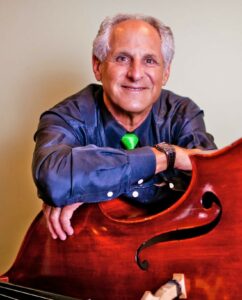 AUSTA Patron Barry Green, a native Californian, served as Principal Bassist of the Cincinnati Symphony for 28 years. As former Executive Director of the International Society of Bassists, and Formerly professor of bass at The Ohio State University, the University of California Santa Cruz and the University of Cincinnati CCM. Green has also written 3 bass method books and many solo recordings. As a bass soloist, Green has created three multimedia productions called Anna’s Way, Anna’s Gift, and Anna’s Promise composed by Andres Martin and based on inspirational stories for solo bass with combos, bands or orchestra. Green’s latest multimedia concert program is a documentary style concert of Russian music called: Music from Ukraine and a new multi-media narrated program based on the Four Elements: Fire, Water, Air and Earth.
AUSTA Patron Barry Green, a native Californian, served as Principal Bassist of the Cincinnati Symphony for 28 years. As former Executive Director of the International Society of Bassists, and Formerly professor of bass at The Ohio State University, the University of California Santa Cruz and the University of Cincinnati CCM. Green has also written 3 bass method books and many solo recordings. As a bass soloist, Green has created three multimedia productions called Anna’s Way, Anna’s Gift, and Anna’s Promise composed by Andres Martin and based on inspirational stories for solo bass with combos, bands or orchestra. Green’s latest multimedia concert program is a documentary style concert of Russian music called: Music from Ukraine and a new multi-media narrated program based on the Four Elements: Fire, Water, Air and Earth.
Green is author of three books dealing with the philosophy of music, the mind, body and spirit: The Inner Game of Music (Doubleday, 1986), The Mastery of Music, Ten Pathways to True Artistry (Broadway/Doubleday 2003) and Bringing Music to Life! (GIA, 2009). Barry’s most recent projects include an eight part video series with co-host Jason Heath called Buckeye Bass Bashes, and a popular video string method called Stringersize, and the formation of the Bass Club Cincinnati that includes programs with local and Internationally known guest artists for the Cincinnati community, For information on Green’s personal appearances, publications and mini-workshops please see his website, www.innergameofmusic.com

